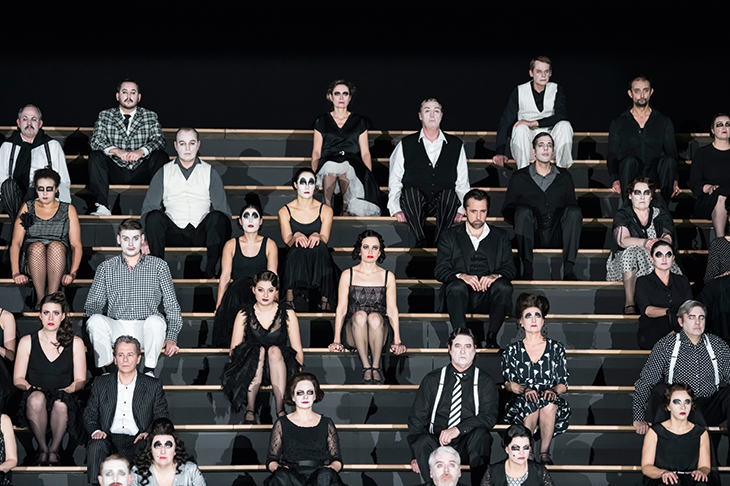The new production of Bizet’s Carmen at the Royal Opera has received mixed reviews. It shouldn’t have done. They should have been unmitigatedly hostile, indignant, outraged — except that all those reactions would almost certainly have delighted the director, Barrie Kosky. What might please him less is the accusation of tedium, of making what often seems an unsinkable work into a colossal bore. This Carmen lasts for three-and-a-half hours and feels as long as that after the first 20 minutes.
The whole and only set is a stage-wide flight of 16 steep stairs, up and down which the cast has to run at frightening speeds. As Jakub Hrusa, the conductor, dashed into the opening bars, hectic rather than brilliant, one wondered what might be added on-stage. But the Prelude stopped halfway through, and a semi-whispering female voice gave us a couple of introductory sentences. Carmen appeared, dressed as a toreador, and I wondered if we were to see a gender-bending version. She soon disappeared, however, and when she made her second entrance, as marked, she had become a gorilla, so it seemed more likely to be a species-bending affair. She shed that costume, though, and wore a white shirt with black tie for the rest of the interminable Act I. Bizet discarded a fair amount of music in production, but this one reinstates it, so Carmen has two entrance arias. There is no dialogue, either accompanied or spoken, just the occasional intrusion of the disembodied narrator.
Though Carmen is rightly one of the most popular operas, it is a problematic piece, and a producer’s first job is to make it seem coherent. The character of Don José is bewilderingly undercharacterised, while Carmen is certainly all of a piece. But Bizet never gives them a chance to realise whatever their love may be. The narrative is curiously telescoped, becoming ever more compressed as it gets more interesting. Micaela and Escamillo are so obviously slotted in to give two singers a chance to sing contrasting arias that really there are just two characters and an assortment of lay figures, including the ‘operetta Norns’ as Adorno wittily describes Frasquita and Mercedes. Virtually all the musical numbers are so brilliant that they conceal the dramatic abysses, so the director needs to help the piece achieve an impression of continuity.
Instead of that Kosky has taken the piece as far as possible, or further than that, in the opposite direction. Static and shorn of dialogue, the singers are mere aria-producers, standing as far apart as they can, their main form of contact a long rope that probably symbolises bondage. The total effect is, at best, one of showing off. There is no drama here at all, because there are no characters to enact it. The most industrious people on-stage are a set of dancers, hyperactive in doing their end-of-pier routines and other slightly more sophisticated moves. Much of their music is previously unheard and further swells the dimensions of the non-drama.
Whether the soloists would impress in their roles it is hard to say, since they don’t get a chance to perform them. On the whole, they aren’t up to anything like the standard of the performers in the previous production, for all its faults. The Russian mezzo in the title role was Anna Goryachova. She had rather a small voice and strange French, but some of her posturings were striking. Francesco Meli, as José, seemed even more bewildered than that character should be, and sang as if he wished he were Turiddu. Unquestionably the loveliest performance was from Kristina Mkhitaryan as Micaela, but her Act I duet with José was bizarrely slow. Kostas Smoriginas made an absurd Toreador. Minor roles were well taken, but in vain. At the end Carmen staged a surprise resurrection, but for the time being Carmen has been destroyed.
A few evenings later, I went to an enterprising concert in the RCM New Perspectives series, dedicated to performing contemporary music. Odd that music written more than 70 years ago should be considered contemporary. Stockhausen’s Zeitmasze (1955–6) is as remote in time from us as it was from Parsifal — and food for much brooding about many cultural issues. A 14-minute piece, it struck me as what Hindemith might have written had he had a startling conversion from the academicism of his 1950s to that of the avant-garde. It is at least interesting, which is more than can be said for the solo sax In Freundschaft (1977). Kontra-Punkte (1952–3), for slightly larger forces, has more colour, but the Stockhausen I respond to more readily is the composer of those immense works, many of which are still unresuscitated denizens of the musical Jurassic Park.





Comments